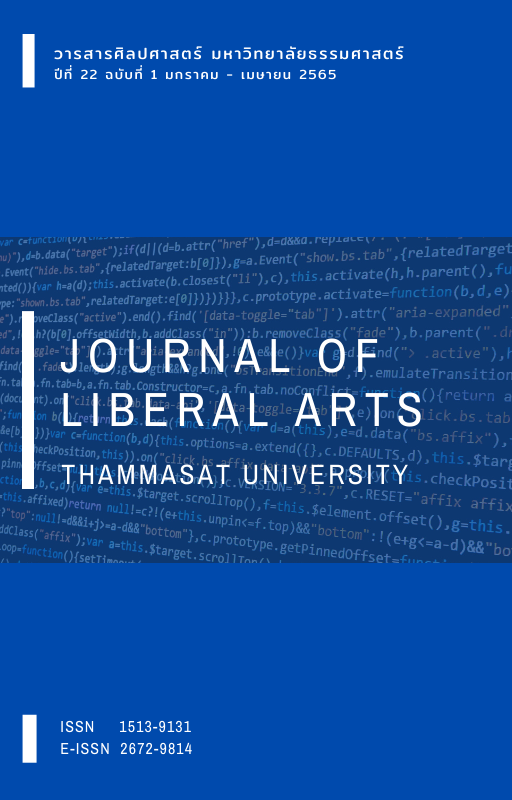Loving Students in the Time of Covid: a Dispatch from LGBT Studies
Main Article Content
บทคัดย่อ
Employing a trans/queer lens to instruction at a midwestern public university in the USA, this essay reflects on a pedagogical approach I developed for teaching during the pandemic. I argue that the pressure to adapt to COVID necessitates interrogating the status quo we’re hustling to maintain as educators, including what agenda we’re being asked to tend, and who is expendable in its upkeep. Specifically, the pandemic forced me to rethink the demands that are made of us as educators, and the demands that we, as educators, place on students in return. I rethink what about my LGBT Studies pedagogy stayed and what had to go—for the sake of both mine and my students’ survival. Specifically, I call for emphasizing resiliency in marginalized communities; applying the course content to surprising (or unlikely) contexts; un-equating coverage with equality or quality; eliminating the penalty and punishment/never play, never joy paradigm from infecting pedagogy; motivating students’ self-reflexive impulse to apply critical theory to their personal lives; and maintaining a grading system based on trust, self-care, and mutual respect. Using my redesigned classroom during the pandemic as an example, I hope to inspire readers to consider what is un/livable and un/lovable in their own pedagogical practice.
Downloads
Article Details

อนุญาตภายใต้เงื่อนไข Creative Commons Attribution-NonCommercial-NoDerivatives 4.0 International License.
เอกสารอ้างอิง
Acacio, N. (Producer), & Lightning, C. & Donoho, A. (Directors). (2018). Janelle Monáe: Dirty Computer [Motion Picture]. Wondaland Arts Society.
Ahmed, S. (2017). Living a feminist life. Duke University Press.
Ahmed, S. (2012). On being included. Duke University Press.
Antwi, P. (2018). On labor, embodiment, and debt in the academy. a/b: Auto/Biography Studies, 33(2), 301-326. https://doi.org/10.1080/08989575.2018.1445577
Brown, A. M. (2018). Pleasure activism. AK Press.
Camangian, P. R. (2021). Let’s break free: Education in our own image, voice, and interests. Equity & Excellence in Education, 54(1), 28-38. https://doi.org/10.1080/10665684.2020.1863882
Dolmage, J. T. (2017). Academic ableism: Disability and higher education. University of Michigan Press.
Driskill, Q. L. (2016). Asegi stories: Cherokee queer and two-spirit memory. University of Arizona Press.
Driskill, Q. L. (2015, February 19). Interview with Qwo-Li Driskill at the Cultured Queer/Queering Culture: Indigenous Perspectives on Queerness Symposium. University of Wollongong, Australia.
Greene, J. (2021). Labor of love: The formalization of care in transgender kinship organizations. Organization, 1-19. https://doi.org/10.1177/1350508421995763
Gipson, G. D. (2016). Afrofuturism’s musical princess, Janelle Monáe: Psychedelic soul message music infused with a sci-fi twist. In R. Anderson & C. E. Jones (Eds.), Afrofuturism 2.0: The rise of astro-Blackness (pp. 91-107). Lexington Books.
Gumbs, A. P. (2012). The shape of my impact. The Feminist Wire, 29(1). http://www.audrelorde-theberlinyears.com/pressclips/TheShapeofMyImpact.pdf
Haraway, D. J. (1991). Simians, cyborgs and women: The reinvention of nature. Routledge.
Harris, L. J. (2018). Healing through (re)membering and (re)claiming ancestral knowledge about Black witch magic. In O. N. Perlow, D. I. Wheeler, S. L. Bethea & B. M. Scott (Eds.), Black Women’s Liberatory Pedagogies (pp. 245-263). Palgrave Macmillan. https://doi.org/10.1007/978-3-319-65789-9_14
Hong, G. K. (2012). Existentially surplus: Women of color feminism and the new crises of capitalism. GLQ, 18(1), 87-106. https://doi.org/10.1215/10642684-1422152
Hwang, R. (2019). Deviant care for deviant futures QTBIPOC radical relationalism as mutual aid against carceral care. TSQ: Transgender Studies Quarterly, 6(4), 559-578. https://doi.org/10.1215/23289252-7771723
Inoue, A. B. (2019). Classroom writing assessment as an antiracist practice: Confronting white supremacy in the judgments of language. Pedagogy, 19(3), 373-404. https://www.muse.jhu.edu/article/733095
Khan, H. (2020). Existentially essential: In/Visibility under racial capitalism. Journal of Asain American Studies, 23(3), 475-490. https://dpi.org/10.1353/jaas.2020.0036
LeMaster, L., & Mapes, M. (2020). Refusing a compulsory want for revenge, or, teaching against retributive justice with liberatory pedagogy. Communication and Critical/ Cultural Studies, 17(4), 401-409. https://doi.org/10.1080/14791420.2020.1829662
LeMaster, L. & Terminel Iberri A. I, (2021). Critical performative pedagogical encounters, or “Let’s try that again. But first, let’s breathe.” Communication Education, 70(3), 1–4. https://doi.org/10.1080/03634523.2021.1912791
Lorde, A. (1984, 2007). Sister Outsider. Ten Speed Press.
Maier, S., Hsu, V. J., Cedillo, C. V., & Yergeau, M. R. (2020). GET THE FRAC IN! or, The Fractal Many-festo: A (Trans)(Crip)t. Peitho, 22(4). https://cfshrc.org/article/get-the-frac-in-or-the-fractal-many-festo-a-transcript/
Mbembe, A. (2003). Necropolitics. Public Culture, 15(1), 11–40.
McKinney, C. (2018). Reassessing intersectionality: Affirming difference in higher education. Composition Forum, 39(1). https://files.eric.ed.gov/fulltext/EJ1188974.pdf
Monáe, J. (2010). The ArchAndroid [Album]. Wondaland Arts Society and Bad Boy Records.
Monáe, J. (2013). The Electric Lady [Album]. Wondaland Arts Society and Bad Boy Records.
Monáe, J. The Ten Droid Commandments. (n.d.). Holly Gocrunkly: The Ten Droid Commandments. Retrieved May, 2021, from http://hollygocrunkly.tumblr.com/ post/746007554/the-ten-droid-commandments
Orem, S., & Simpkins, N. (2015). Weepy Rhetoric, trigger warnings, and the work of making mental illness visible in the writing classroom. Enculturation: A Journal of Rhetoric, Writing, and Culture, 20. http://enculturation.net/weepy-rhetoric
Pausé, C. (2017). Candy perfume girl: Colouring fat bodies. Zeitschrift für Geschlechterforschung und Visuelle Kultur, 62(1), 74–86. https://www.fkw-journal.de/index.php/fkw/article/view/1403
Price, M. (2011). Mad at school: Rhetorics of mental disability and academic life. University of Michigan Press. https://www.jstor.org/stable/10.3998/mpub.1612837
Puar, J. (2007) Terrorist assemblages: Homonationalism in queer rimes. Duke University Press.
Rabinow, P. (Ed.). (1991). The Foucault Reader: An introduction to Foulcault’s thought. Penguin.
Shalk, S. (2018). Bodyminds reimagined: (Dis)ability, race, and gender in Black women’s speculative fiction. Duke University Press. https://doi.org/10.1215/9780822371830
Spade, D. (2020). Solidarity not charity: Mutual aid for mobilization and survival. Social Text, 38(1 (142)), 131-151. https://doi.org/10.1215/01642472-7971139
Spencer, L. G. & Kulbaga, T. A. (2018). Trigger warnings as respect for student boundaries in university classrooms. Journal of Curriculum and Pedagogy, 15(1), 106-122. https://doi.org/10.1080/15505170.2018.1438936
Snorton, R. & Haritaworn, J. (2013). Trans necropolitics. In A. Aizura & S. Stryker (Eds.), Transgender studies reader (2nd ed., pp. 66-76). Routledge.
Stanley, P. (2020). Unlikely hikers? Activism, Instagram, and the queer mobilities of fat hikers, women hiking alone, and hikers of colour. Mobilities, 15(2), 241-256, https://doi.org/10.1080/17450101.2019.1696038
Taylor, K. Y. (2017). How we get free: Black feminism and the Combahee River Collective. Haymarket Books.
Wang, J. (2018). Carceral capitalism. Semiotext(e).
Williams, B. C., Squire, D. D., & Tuitt, F. A. (2021). Plantation politics and campus rebellions: Power, diversity, and the emancipatory struggle in higher education. SUNY University Press.


